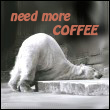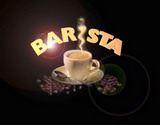I think its a good question!
Look. We drink coffee every morning to cheer up.
But also we drink coffee to relax after a hard day.
It is very strange and it is not clear!!!
isn's?
Why do we drink coffee to relax if caffeine is a stimulant?
16 posts • Page 1 of 1
Why do we drink coffee to relax if caffeine is a stimulant?
Coffee Should be Black as Hell, Strong as Death, and Sweet as Love
-

SanchoPancho - old member

- Posts: 124
- Joined: 22 Jan 2010, 05:18
- Location: Maxica
Re: Why do we drink coffee to relax if caffeine is a stimulant?
I can explain.
Caffeine is a drug believe you it or not.
Drink enough of it and you become dependent on it.
I drink a cup of coffee each morning to help me stay awake.
Now I drink coffee each morning because I get anxious and irritated when I don't drink it.
Caffeine is a drug believe you it or not.
Drink enough of it and you become dependent on it.
I drink a cup of coffee each morning to help me stay awake.
Now I drink coffee each morning because I get anxious and irritated when I don't drink it.
I like to move it, MOVE IT
-

CoffeeLover - old member

- Posts: 143
- Joined: 11 Dec 2009, 04:22
- Location: Coffee Landia
Re: Why do we drink coffee to relax if caffeine is a stimulant?
At the real connoisseurs of coffee instead of blood coffee flows.
so any energetic drinks have no effect on us
so any energetic drinks have no effect on us
I don't have a problem with caffeine. I have a problem without caffeine!
-

CrazyBaby - old member

- Posts: 118
- Joined: 23 Dec 2009, 07:58
- Location: Alkatraz City
Re: Why do we drink coffee to relax if caffeine is a stimulant?
A good question....And I guess no one can tell you for sure why...But I guess people drink it as a relaxing remedy because it really calms, gives pleasure and joy, helps staying sleepless when you really want to sleep, etc. So coffee brings a lot of benefits which positively affects someone's health and thus relaxes in a way.
Hope I answered your question
Hope I answered your question

Coffee & Love Taste Best When Hot
-

jennyffer777 - old member

- Posts: 127
- Joined: 11 Jan 2010, 02:40
Re: Why do we drink coffee to relax if caffeine is a stimulant?
I agree that it has to do with the feelings it brings out because of the familiarity. I guess it's the same for people who spend each morning with the newspaper or jogging around the block to relax. It's just what we do!
- muggles
- newbie

- Posts: 10
- Joined: 19 Apr 2010, 12:17
Re: Why do we drink coffee to relax if caffeine is a stimulant?
Drinking a cup of coffee early in the morning gives me more energy. 
It serves as my own alarm clock to wake up my brain. It's very refreshing to drink coffee all the time. I just can't imagine myself drinking soft drinks or juices while reading newspaper. Sounds weird!

It serves as my own alarm clock to wake up my brain. It's very refreshing to drink coffee all the time. I just can't imagine myself drinking soft drinks or juices while reading newspaper. Sounds weird!
- mizhanna
- newbie

- Posts: 10
- Joined: 21 Apr 2010, 00:02
Re: Why do we drink coffee to relax if caffeine is a stimulant?
It is confusing and to me I guess it's soothing and comforting but it also helps me wake up in the mornings. I know there is caffeine in some headache remedies so maybe even though it's a stimulant it relaxes you too?
- coffeequeen
- newbie

- Posts: 10
- Joined: 21 Apr 2010, 13:37
Re: Why do we drink coffee to relax if caffeine is a stimulant?
Wow, I drink coffee for so many years and never asked myself why? hhmmm
I guess we drink it namely because it's a stimulant.... And when we relax, we don't need to simply relax, we need some inner energy to really like our recreation....Hope I didn't mix you up!
And when we relax, we don't need to simply relax, we need some inner energy to really like our recreation....Hope I didn't mix you up!
I guess we drink it namely because it's a stimulant....
 And when we relax, we don't need to simply relax, we need some inner energy to really like our recreation....Hope I didn't mix you up!
And when we relax, we don't need to simply relax, we need some inner energy to really like our recreation....Hope I didn't mix you up!Be a coffee-drinking individual - espresso yourself!
-

paula - member

- Posts: 62
- Joined: 19 Feb 2010, 01:06
Re: Why do we drink coffee to relax if caffeine is a stimulant?
Because we are narcomaniacs-coffeelovers


Instant human. Just add coffee.
-

killer666 - old member

- Posts: 144
- Joined: 13 May 2010, 03:45
- Location: Sin City
Re: Why do we drink coffee to relax if caffeine is a stimulant?
If you drink coffee regularly the effects are not so strong. you don't feel a jolt or somenting else. If you're used to coffee and you don't drink it like you usually do, you will start feeling fatigued and even a little headachy.
Some things in life are better rich. . . coffee, chocolate, men.
-

Nicky - old member

- Posts: 143
- Joined: 08 Feb 2010, 02:52
- Location: Why, Arizona, USA
Re: Why do we drink coffee to relax if caffeine is a stimulant?
I mostly drink coffee because I need something hot to drink during the day and I need it to be tasty. What could that be? Milk? Tea? Grog? No! That should be coffee - the most delicious beverage in the world. It wakes me up in the morning only when very strong. Otherwise I sleep quite good. Maybe just peculiarities of my organism.
-

DarkRoastJack - newbie

- Posts: 16
- Joined: 20 Jul 2010, 06:25
Re: Why do we drink coffee to relax if caffeine is a stimulant?
I would say then that coffee works either way, like a double-edged sword. I do take coffee when the chance suffices and maybe that explains my inaddiction. I would never take a cup to stay awake though.
- loppe
- newbie

- Posts: 10
- Joined: 22 Jul 2010, 08:08
Re: Why do we drink coffee to relax if caffeine is a stimulant?
I don't drink it to relax anyway. I drink it to wake me up in the morning. That's why it has to be very strong and flavoursome. I also drink coffee when I'm travelling because it keeps me alert .
- chocaloca
- newbie

- Posts: 30
- Joined: 22 Jul 2010, 04:28
Re: Why do we drink coffee to relax if caffeine is a stimulant?
I drink coffee differently for different reasons. I brew it strong and drink it almost black in the morning; the wake up starts with the taste buds and continues throughout the body. I drink it not so strong and with more milk in the afternoon, strictly for taste. If I have a cup after dinner it not so strong and I drink it black; relaxing in the taste like a dessert. I don't it iced - the cold interrupts the taste and the ice dilutes. By the way I love your captions.
- MakeitBlack
- newbie

- Posts: 11
- Joined: 13 Aug 2010, 14:53
Re: Why do we drink coffee to relax if caffeine is a stimulant?
I drink coffee without milk in the morning and then with milk later in the afternoon. Never really thought about it in relation to how I feel throughout the day, but the milk must be psychologically more soothing - maybe...
- RomboutsUK
- newbie

- Posts: 16
- Joined: 18 Aug 2010, 01:12
Re: Why do we drink coffee to relax if caffeine is a stimulant?
I probably drink 2 cups a coffee per week at most. It doesn't matter what time I drink it I still have a different end result. If I have it in the morning I find it to be a stimulant, plain and simple (like any stimulant, if you consume a lot and you haven't developed a tolerance you're subject to a possible "crash" afterwards but I'm not addressing that phenomenon here....thankfully that's not in issue for me). If I have it in the evening I find it to be a relaxant. I absolutely AGREE with some of the posts here that the reaction my body gets counteracts some sort of distress by redirecting it in a beneficial way (i.e. refocuses my lingering work day stress by "stimulating" me to "de-stress" enough to engage in something more fun, and thus, relaxing).
Also, as a 3rd generation (at least) migraine sufferer (ours are caused by a Functional Disorder of Mitochondria) I can say for certain in my case caffeine is NOT a trigger. Our family's three generations of sufferers are also "stroke prone" as well as "seizure prone." The prescription medications we use to treat these "attacks" are very specific to the respective condition. With regards to my treatment of migraines, which is thankfully more common (at this point I've only had mini-strokes) for the three of us, only Imitrex & Relpax are effective but we are lucky to have a 100% success rate. And based on the severity at the onset in combination of how "far we are into each episode" is how we treat it effectively using a range of methods that include what we refer to as a minimal approach (tablets), to a moderate approach (nasal spray), to an aggressive approach (injection). As someone who is well-versed as a lifetime migraine sufferer and who has embarked in state-of-the-art treatments such as the long-term inpatient treatment I received at the International Center for Epilepsy (ICE) at the University of Miami as well as many other notable neurological research institutions in the U.S. I wanted to include this for anyone struggling with migraines. I found another beneficial preventive treatment given intravenously called Dihydroergotamine that's wonderful when I have access to it on a regular basis. Unfortunately, I now live 120 miles away one way. I've also participated to help my fellow migraine sufferers by being a "guinea pig" to further research. I also tried Botox injections to treat and prevent the migraines but in my case I didn't receive a net benefit because I am too "nerve sensitive" due to Post Neuropathic Pain from recurrent Shingles infections (which I'm also prone to).
All in all, you will find that caffeine either hinders (usually through rebound), has no effect, or alleviates in some cases (by constricting the blood vessels to decrease pain). Caffeine is only in Excedrin migraine to enhance the body's absorption not to treat the migraine specifically. Finally, I thought wrongly for many years that caffeine had mistakenly assisted me because it dilated the brain's blood vessels, which I felt somehow this translated this to the vessels being relaxed and that was indicated by them expanding. Also, I guess I might also have been confused as the phrase "constricted blood vessels" sounds a bit painful to me. All in all, I don't know completely why I had this misconception but as I gained more experienced with each migraine episodes I can now see how that blood vessels being forced to expand causes them to become inflamed, throb, and cause the pounding pain that is so overwhelming. So to recap, blood vessels constriction is good & dilation is bad. Hope this helps anyone who is suffering and/or relates to the "coffee aftereffects" that I have. (Thanks for reading!)
Also, as a 3rd generation (at least) migraine sufferer (ours are caused by a Functional Disorder of Mitochondria) I can say for certain in my case caffeine is NOT a trigger. Our family's three generations of sufferers are also "stroke prone" as well as "seizure prone." The prescription medications we use to treat these "attacks" are very specific to the respective condition. With regards to my treatment of migraines, which is thankfully more common (at this point I've only had mini-strokes) for the three of us, only Imitrex & Relpax are effective but we are lucky to have a 100% success rate. And based on the severity at the onset in combination of how "far we are into each episode" is how we treat it effectively using a range of methods that include what we refer to as a minimal approach (tablets), to a moderate approach (nasal spray), to an aggressive approach (injection). As someone who is well-versed as a lifetime migraine sufferer and who has embarked in state-of-the-art treatments such as the long-term inpatient treatment I received at the International Center for Epilepsy (ICE) at the University of Miami as well as many other notable neurological research institutions in the U.S. I wanted to include this for anyone struggling with migraines. I found another beneficial preventive treatment given intravenously called Dihydroergotamine that's wonderful when I have access to it on a regular basis. Unfortunately, I now live 120 miles away one way. I've also participated to help my fellow migraine sufferers by being a "guinea pig" to further research. I also tried Botox injections to treat and prevent the migraines but in my case I didn't receive a net benefit because I am too "nerve sensitive" due to Post Neuropathic Pain from recurrent Shingles infections (which I'm also prone to).
All in all, you will find that caffeine either hinders (usually through rebound), has no effect, or alleviates in some cases (by constricting the blood vessels to decrease pain). Caffeine is only in Excedrin migraine to enhance the body's absorption not to treat the migraine specifically. Finally, I thought wrongly for many years that caffeine had mistakenly assisted me because it dilated the brain's blood vessels, which I felt somehow this translated this to the vessels being relaxed and that was indicated by them expanding. Also, I guess I might also have been confused as the phrase "constricted blood vessels" sounds a bit painful to me. All in all, I don't know completely why I had this misconception but as I gained more experienced with each migraine episodes I can now see how that blood vessels being forced to expand causes them to become inflamed, throb, and cause the pounding pain that is so overwhelming. So to recap, blood vessels constriction is good & dilation is bad. Hope this helps anyone who is suffering and/or relates to the "coffee aftereffects" that I have. (Thanks for reading!)
-

Jenna - newbie

- Posts: 1
- Joined: 12 Jul 2014, 14:23
16 posts • Page 1 of 1
Who is online
Users browsing this forum: No registered users and 5 guests
